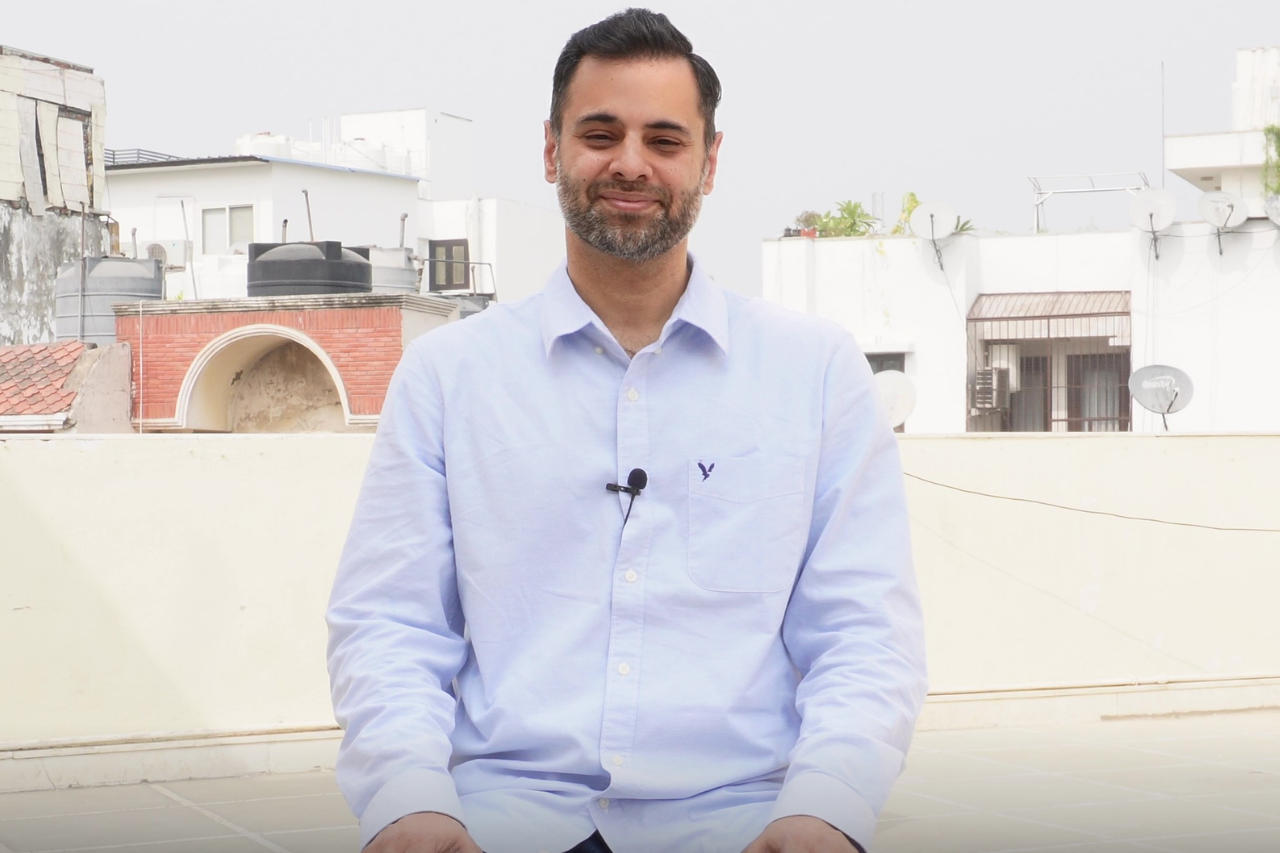Any effort towards enlightenment or self-realization leads to the strengthening of personal identification. There’s no individual person that ever gets enlightened. It is simply the end of “me and my story.”
Ramana Maharishi was all about seeking the SELF. He relentlessly emphasized that SELF is the highest truth. Nisargadatta Maharaj called it the supreme reality, traditional non-duality teachers called it Brahman, and the new age spiritual teachers describe it as pure consciousness or pure awareness.
No matter what you call it, every attempt to describe it reduces it to a concept, and that’s where the problem arises. The moment you try to explain the unexplainable, unimaginable, and indescribable, you reduce it to a state – something desirable and a worthy goal to attain.
The mind begins contemplating tricks and strategies to access a state of pure bliss where no suffering exists – a state of everlasting happiness and peace. But how do you experience lasting happiness with an aging body that is decaying every minute? What do you do about the nonstop chattering mind?
Making the mind in charge of the chattering mind is not a good idea. It’s guaranteed to fail. It’s like employing a thief to protect your valuables or putting an arsonist in charge of the fire engines. And what about the aging and ailing body? It’s not in our control. Though we can make the body resilient with exercise, we can’t prevent aging and death.
When the mind realizes that it can’t do anything about practically anything that happens in life, it comes up with the most cunning idea of enlightenment. Personally, I struggled for years to understand what it means. At some point, I gave up the idea. Different people have different views on what enlightenment is.
What Is Enlightenment Anyway?
I dislike the word enlightenment because when people ask about it, they have a particular perception or idea of what enlightenment should be. Does it mean that one has a flawless personality, entirely in control of their thinking, with the ability to manage emotion wilfully?
Are they vegan? Do they care about animals? Are they into activism? Are they always politically correct? Do they talk about world peace and care for humanity? Do they ever get angry or upset with people? What should be their sexual preference?
If you notice, the questions above are qualities that we like to see in so-called enlightened masters. Therefore, we put them on a pedestal and project our desirable image onto them. We imagine near-perfect human beings that are infallible.
Especially In India, a person wearing a robe with a shaved head and living life like an ascetic is worshipped by people as an Avatar of God. The idea of renouncing the world for higher spiritual attainment – call it moksha, freedom, enlightenment, or whatever you like, is appealing to the masses.
These masters spend decades studying scriptures like the Vedas and Upanishads. They flawlessly recite verses from the scriptures with great pride and enthusiasm. They reject all worldly desires in their search for truth, practicing years of rigid discipline.
And all of this appeals to ordinary people cause most of them to have a poor self-image. They project their own desirable traits onto these masters and create expectations. When the enlightened masters falter, these people are the first to push them from the pedestal.
There are countless cases of spiritual masters going rogue or engaging in unholy acts behind closed doors. It reminds me of a story that the Advaita teacher Ramesh Balsekar told in one of his Satsangs.
There was a renowned spiritual guru in Mumbai who ran a popular organization. Millions of people visited the guru to seek his blessing. A man was so influenced by the guru’s teachings that he left his corporate job to join the foundation.
After the long day’s discourse, the guru would retire into his room to rest. Only a handful of people were allowed in his room. As this man grew closer to the guru, he got the privilege of entering the guru’s room in case of emergencies.
One day he wanted to discuss an urgent matter with the guru, so he entered the room late in the evening. To his shock, he found the guru in a compromising situation with a young man. He froze for a while as he watched the scene and then quietly went out of the room, closing the door.
He felt disgusted and resigned from his position in the foundation the very next day. He was so upset that he did not even want to see the guru’s face. However, at other people’s insistence, he decided to meet the guru before leaving the foundation.
He and the guru sat face-to-face, and there was silence for some time. Then the guru asked him to stay back, but he refused. The guru’s final words to him were, “You have created the problem, and now you only have to solve it.” After that, he left, never to come back again.
How would you analyze this situation? Was the guru at fault for hiding his affair with a young man and his sexual preference? In the Indian conservative culture, spiritual masters are often judged for their personal choices and behaviors.
In another anecdotal account by Jiddu Krishnamurti, he spoke about a young monk who came to see him. This young fellow in his early twenties got himself operated (castration) through a medical procedure to get rid of his sexual desire.
Through years of conditioning by the religious authorities, he had started to believe that his liberation (another covert word for enlightenment) was marred by his inability to control sexual urges. He was in tears when he met Krishnamurti but could do nothing as it was too late.
How can a saintly person have worldly material desires? You see, our body is also material, and it doesn’t understand the concept of enlightenment that our mind projects.
I’m not saying that every person in a robe is a rogue. I’ve met some genuine masters who I know have deep spiritual understanding. They don’t live to fulfill other people’s expectations. What I am saying is that we can’t judge a master by their choices and personal preferences.
If the idea of enlightenment is to deny worldly pleasures and subject oneself to torture through sexual restraint or denying pleasures for your entire life, then it is a twisted thought.
Spiritual Awakening Leads To Understanding
Spiritual awakening is not achieving a permanently blissful state but the breakdown of illusory structures of the ego-mind. For most people, spiritual awakening is brutal, sometimes causing deep existential crises and depression. Enlightenment, on the other hand, is just a concept.
I prefer to use the word understanding rather than enlightenment. While the spiritual awakening happens instantaneously, the understanding dawns gradually. As this understanding deepens, the mind settles down, and the individual learns to live in high awareness.
So what is the understanding? It is that we’re not the doer of our actions. In the words of Buddha, actions happen, deeds happen, and even the consequences happen, but there is no individual doer thereof.
As this understanding deepens, the dispassion towards the materialistic life naturally occurs as the individual is no more concerned with the results of their actions. The ego realizing that only the cosmic law prevails, suspends the sense of doership, resulting in peace, tranquility, and compassion.
Even with the understanding, the individual mind-body organism continues to live life as earlier, but there’s a shift in perspective. The shift is that the involvement in worldly affairs is gone. The self-realized individual does not deny anything in the world, but at the same time, they don’t get too attached or involved.
Before spiritual awakening, the individual attached to doership puts effort into achieving the desired outcome to enhance his/her sense of personal self. For example, the person may work hard to fulfill worldly desires like buying a house and conveniences like cars, phones, etc.
For him, things like money, power, position, stature, and prestige matter more than peace of mind. All of these pursuits enhance his sense of personal identification. He derives his sense of self-worth from the value of possessions he accumulates.
He believes that he’s a separate individual living in separation from the rest and has to prove his worthiness to gain respect and validation from other people. Therefore, the idea of achieving wealth and fame through hard work appeals to him.
But the problem is that it further increases the separation, which itself becomes the cause of suffering. In a society deeply entrenched in consumerism, it is commonly seen that most people are always on a chase to better themselves by acquiring external possessions-something to make them whole.
Make no mistake; this can happen even in spiritualism. It is called spiritual materialism. Some time back, a girl approached me with questions related to Kundalini awakening. She was experiencing a surge in kundalini energy, so much so that she could not focus on work or family.
As a result, her life was in disarray. She desperately wanted a solution to her Kundalini awakening problem as it was causing discomfort and panic. She was not happy when I suggested that she speak to a counselor or a therapist. The psychological picture of Kundalini rising was so firmly embedded in her mind that she didn’t want to explore an alternative approach.
She wanted instant liberation from pain and suffering. When she approached, she projected an image of a guru onto me. As I did not provide the solution she was hoping for, she immediately pushed me off the pedestal, and I never heard from her again.
Most people have preconceived ideas about spirituality and enlightenment, and it is incredibly challenging to break down these fictitious ego structures. They believe that through enlightenment, they will achieve a permanently blissful state. And hence, enlightenment becomes another desirable object, just like other material desires.
Enlightenment does not offer a solution to any problem. It is the understanding that the problems created by the obsessively thinking ego-mind have no answers in the external world. It is not an experience, as all experiences are transient.
The ego-mind identified with an experience will keep chasing it for the rest of its life. You may see Buddha, Jesus, and Krishna in meditation, but they will all go away when you return to work the next day.
After a spiritual awakening, the individual sees the illusory nature of the world. All ideas, beliefs, and concepts lose begin to their grip on him (or her). He no longer chases ideas in order to enhance his personal sense of self.
He clearly sees the futility of the obsessive thinking mind and how it leads to unnecessary involvement that causes pain and suffering. It is the dawn of something beautiful – witnessing. In witnessing, things and events are seen for what they are; and not from the biased perspective of the ego-mind.
However, even at this stage, the individual is not entirely at peace as it is just the beginning of understanding. As the understanding deepens and the individual realizes that he is not the doer, surrender happens.
But what about paying bills, mortgages, student loans, work deadlines, and relationships? All of these remain, but the involvement of the ego in the drama disappears. A self-realized person continues to work and pay bills, but there’s a greater realization in the background of awareness that all of life is illusory and one is already what one seeks.
When the load of doership is gone, peace is the natural outcome. Such people don’t bother much about the outcome of their work.
There’s No “You” That Ever Gets Enlightened
The above article is a sample from my latest book – The End of “Me & My Story.” You can get it here on Amazon.

